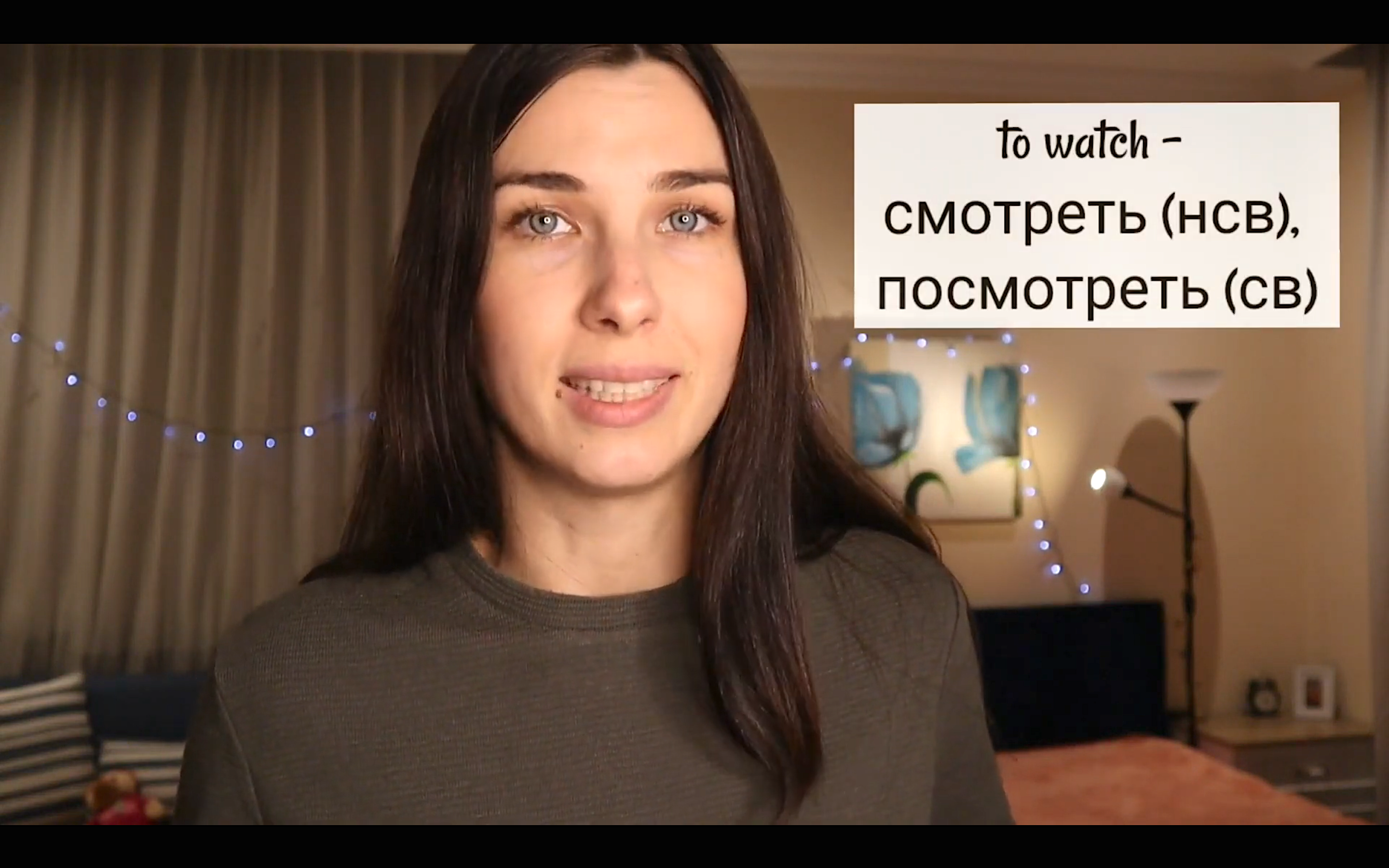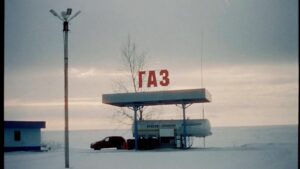
Result or process
Russian verbs are either perfective (совершенный вид, сов./св.) or imperfective (несовершенный вид, нес./нсв.) and thus form pairs. The first expresses result (a completed action), the second process, unfinished or repeated action. To compare with the difference between reading out and reading in.
I am reading a book (right now, every day, for two hours, etc.): Я читаю книгу, from verb читать (imperfective). I read a book (out, at the end, three times, etc.): Я прочитал книгу, from verb прочитать (perfective). And with Я прочитаю you say you will read it (out).
Distinctions and verb pairs
As simple as in читать and прочитать, imperfective and perfective are not always distinguishable. However, more often you can tell by the preposition what is what, as in видеть – увидеть (see), играть – сыграть (play) and расти – вырасти (grow). The verb with preposition is then always the perfective of the two; покупать – купить (buy) is an exception.
These are some common verb pairs (imperfective – perfective):
- брать – взять (take)
- говорить – сказать (speak/say)
- давать – дать (giving)
- делать – сделать (do)
- думать – подумать (thinking)
- знать – узнать (know)
- изучать – выучить (learning)
- платить – заплатить (pay)
- покупать – купить (buy)
- пить – выпить (drink)
- помнить – запомнить (remember)
- помогать – помочь (help)
- понимать – понять (understanding)
- работать – поработать (work)
- сидеть – сесть (sitting)
- слышать – услышать (hearing)
- смотреть – посмотреть (looking)
- спрашивать – спросить (asking)
- становиться – стать (become)
- учить – выучить (learn)
- ходить – сходить (walk/go)
- хотеть – захотеть (want)
Twenty forms
Because result always refers to past or future tense (I read the book or I will read it), the perfective verb has no (conjugations in) present tense. The imperfective is already there for that. It too has (conjugations in) past tense; for future tense you conjugate (only) the verb be. Both in я читал (I read) and я буду читать (I will read) you speak of the process or of a repeated/unfinished action.
All this leads to each verb pair having 20 conjugations. Which sometimes you just have to learn by heart, because not all parts are equally logical or predictable. See for example this one, from давать and дать (giving).
| давать (imperfect) | дать (perfective) |
| ——————— | —————– |
| | |
| present tense | future tense |
| (я) даю | (я) дам |
| (ты) даёшь | (ты) дашь |
| (он/она/оно) даёт | (он/она/оно) даст |
| (мы) даём | (мы) дадим |
| (вы) даёте | (вы) дадите |
| (они) дают | (они) дадут |
| | |
| past tense | past tense |
| (я/ты/он) давал | (я/ты/он) дал |
| (я/ты/она) давала | (я/ты/она) дала |
| (оно) давало | (оно) дало |
| (мы/вы/они) давали | (мы/вы/они) дали |
More at multiple channels. Here by year (new-old) of the inserted video.
Russian Step by Step
Aspects of Russian verbs: imperfective and perfective
(2021, 14 m)
Amazing Russian
Verbal Aspect in Contrast. Part 1: Imperfective Present vs. Perfective Past
(2020, 16 m)
See also
- Part 2: Imperfective Past vs. Perfective Past (2017, 16 m)
- Part 3: Imperfective Present vs. Perfective Future (2017, 14 m)
- Part 4: Two Future Tenses (2017, 11 m)
- Part 5: Multiple Events (2017, 16 m)
О русском по-русски
Делать или сделать? | Глаголы НСВ и СВ. Настоящее-прошедшее время
(2019, 18 m)
See also Урок 2. Буду делать или сделаю? | Глаголы НСВ и СВ. Будущее время (2019, 18 m) en van daarna Инфинитив НСВ или СВ? || Глаголы НСВ и СВ (2020, 21 m).
Live Russian
Clues To Perfective and Imperfective Verbs in Russian
(2019, 6 m)
See also Imperfective / perfective verbs: how to spot (2018, 9 m), Perfective or Imperfective / Practice (2018, 12 m) and from recent (2021) multiple livestreams. From the introduction to more recent
- Imperfective vs Perfective / main concept (71 m)
- Imperfective vs Perfective / future tense (59 m)
- Imperfective vs Perfective / future tense (65 m)
- Imperfective vs Perfective / future tense (51 m)
and then two songs as well, about заказывать – заказать and брать – взять.
Russian grammar
Verbal Aspect in Russian: an Introduction
(2013, 3 m)
See also Verbal Aspect in Russian (II): Forms (2013, 5 m).
More
Zie
- Perfective vs Imperfective in Russian (Prosto Russian, 2021, 6 m)
- The perfective and imperfective aspects of russian verbs (NovaMova, 2021, 7 m)
- Russian Grammar: Imperfective/Perfective pairs in Russian (Anna Cher, 2020, 16 m)
- Russian Perfective & Imperfective verbs | Verb Aspects in Russian Language (Russian with Nastya, 2020, 17 m)
- Russian verbs aspects – live lesson (Real Russian Club, 2020, 52 m)
- Aspect of Russian verbs. Perfective and imperfective verbs (Russian with Tanya, 2020, 16 m)
- Introduction to Russian Verbal Aspect (Russian Through Propaganda, 2020, 69 m)
- Russian verbs. Aspect (Naya Polo, 2019, 7 m)
- Perfective & Imperfective verbs through special word Раньше (LRW Alfia, 2019, 12 m), zie ook Learn Russian future tense of perfective verbs (2020, 12 m)
- Aspects in the Past Tense | Russian Language (Be Fluent in Russian, 2019, 8 m), zie ook Perfective VS Imperfective (2017, 9 m)
- Russian Future Tense: Formation and Usage / Imperfective and Perfective (Russian Language in Detail, vh. RussianWithRussian, 2017, 7 m)
- Глаголы несовершенного и совершенного вида (говорим по-русски, vh. русский с носителем, 2017, 13 m)
- A Little Bit Of Grammar. Imperfective vs Perfective (Russian from Russia, 2016, 13 m), zie ook Future Imperfective vs Perfective (2016, 14 m)
- Verbs. Perfective and Imperfective. Russian grammar (Ru-Land Club, 2016, 7 m)
- Russian – perfective and imperfective verbs, aspect (A. Romaker, 2015, 15 m)
See/read
- Aspects of Russian verbs (Enjoy Russian, 2019)
- Aspects of Russian Verbs – Imperfective and Perfective (Learn Russian)
- Aspects of Verbs in Russian (Russian Lesson)
- Aspect of the Verb (Master Russian)
- Grammatical aspect in Slavic languages (Wikipedia)
- Het aspect van het werkwoord (Russische grammatica, 2012)
- Perfective & Imperfective Verbs in a nutshell (Explore Russian, 2016)
- Perfectief aspect (Wikipedia)
- Russian verb aspects (Learn Russian Step by Step)
- Russian Verbs – Aspect (RussianLessons.net)
- Russian Verbs – Perfective and Imperfective Aspects (Russian Language Blog, 2011)
- Russian Verbs That Can Be Both Perfective and Imperfective (Russificate, 2018)
- Verbal Aspect (Russian For Everyone)
- Verb Aspects in Russian (RussianTutoring.com)
- What Makes Russian So Hard: Perfective and Imperfective Verbs (Proper Russian)
More
Taal
There was certainly no shortage of YouTube channels teaching Russian, but there’s always room for one more – therefore, also always for more than one. Here are seven pretty new ones, worth checking out.
Amsterdam, November 4. In the queue of people waiting in front of the doors of AFAS. Where Zemfira will soon be performing. Left, right, front and back: Russian everywhere. My company almost feels at home.
VERB VOCABULARY
Verbs work for those who want to make sentences. There – work and make, there you already have two. And try to make Russian out of that sentence if you if you don’t know работать or делать. So work, also on your vocabulary.
Even with bad news there is good news: there is a lot to learn from it. Russian news articles are excellent teaching material, even for the more advanced student.
The sixth noun, in Russian предложный падеж, is for most students the first one they learn. The reason is simple: the sixth grammatical case itself is.
OPERATION WAR
And then it became war. Or should we say began the special military operation. On February 24 2022 Russian troops entered Ukraine. It was allowed neither war nor invasion be called, but it was akin to both.







